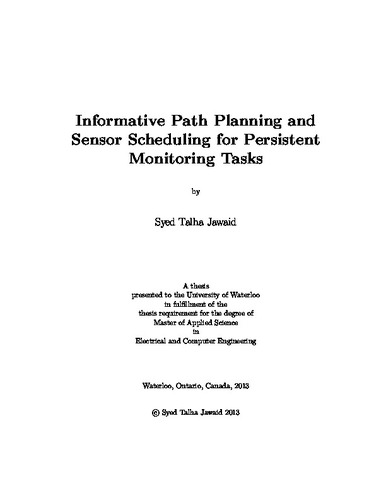| dc.contributor.author | Jawaid, Syed Talha | |
| dc.date.accessioned | 2013-09-24 17:28:00 (GMT) | |
| dc.date.available | 2013-09-24 17:28:00 (GMT) | |
| dc.date.issued | 2013-09-24T17:28:00Z | |
| dc.date.submitted | 2013 | |
| dc.identifier.uri | http://hdl.handle.net/10012/7896 | |
| dc.description.abstract | In this thesis we consider two combinatorial optimization problems that relate to the field of persistent monitoring.
In the first part, we extend the classic problem of finding the maximum weight Hamiltonian cycle in a graph to the case where the objective is a submodular function of the edges. We consider a greedy algorithm and a 2-matching based algorithm, and we show that they have approximation factors of 1/2+κ and max{2/(3(2+κ)),(2/3)(1-κ)} respectively, where κ is the curvature of the submodular function. Both algorithms require a number of calls to the submodular function that is cubic to the number of vertices in the graph. We then present a method to solve a multi-objective optimization consisting of both additive edge costs and submodular edge rewards. We provide simulation results to empirically evaluate the performance of the algorithms. Finally, we demonstrate an application in monitoring an environment using an autonomous mobile sensor, where the sensing reward is related to the entropy reduction of a given a set of measurements.
In the second part, we study the problem of selecting sensors to obtain the most accurate state estimate of a linear system. The estimator is taken to be a Kalman filter and we attempt to optimize the a posteriori error covariance. For a finite time horizon, we show that, under certain restrictive conditions, the problem can be phrased as a submodular function optimization and that a greedy approach yields a 1-1/(e^(1-1/e))-approximation. Next, for an infinite time horizon, we characterize the exact conditions for the existence of a schedule with bounded estimation error covariance. We then present a scheduling algorithm that guarantees that the error covariance will be bounded and that the error will die out exponentially for any detectable LTI system. Simulations are provided to compare the performance of the algorithm against other known techniques. | en |
| dc.language.iso | en | en |
| dc.publisher | University of Waterloo | en |
| dc.subject | Monitoring | en |
| dc.subject | Submodular functions | en |
| dc.subject | Kalman filter | en |
| dc.subject | Sensor selection | en |
| dc.title | Informative Path Planning and Sensor Scheduling for Persistent Monitoring Tasks | en |
| dc.type | Master Thesis | en |
| dc.pending | false | en |
| dc.subject.program | Electrical and Computer Engineering | en |
| uws-etd.degree.department | Electrical and Computer Engineering | en |
| uws-etd.degree | Master of Applied Science | en |
| uws.typeOfResource | Text | en |
| uws.peerReviewStatus | Unreviewed | en |
| uws.scholarLevel | Graduate | en |

